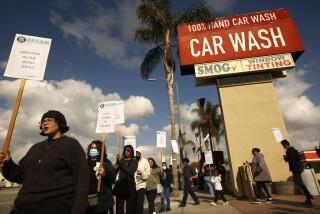Slave Laborers Can’t Sue Japanese Firms, Court Says
- Share via
Mitsubishi Materials Corp., Japan’s largest nonferrous metal smelter, and other Japanese companies can’t be sued in California by people who say they were forced to work as slave laborers during World War II, a state appeals court said.
A San Diego appeals court said the 1951 peace treaty that formally ended the war blocks such lawsuits. The ruling is the third in the last month on reparations for former slave laborers. A federal appeals court, in a ruling last month, also said Californians couldn’t sue Japanese companies.
The suit was brought by survivors of Japanese prisoner-of- war camps against Mitsubishi Materials, which lost a trial court bid to have such suits thrown out and appealed.
The state appeals court sided with the federal government, which argued that claims against Japan were settled by the 1951 treaty.
“The federal government has the better part of the argument regarding the effect of the treaty,” the state court said. “Simply put, it precludes this lawsuit from going forward.”
Arne Wagner, an attorney for Mitsubishi Materials, didn’t return a message seeking comment.
A Los Angeles appeals court reached the opposite conclusion last month, saying the suits could go forward. Opposing state appeals court rulings can be taken up by the California Supreme Court.
The suits were sparked by a 1999 California law that allowed World War II soldiers, civilians and their heirs to sue corporations to recover wages.
More to Read
Inside the business of entertainment
The Wide Shot brings you news, analysis and insights on everything from streaming wars to production — and what it all means for the future.
You may occasionally receive promotional content from the Los Angeles Times.










